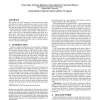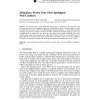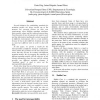504 search results - page 80 / 101 » Determining the user intent of web search engine queries |
PVLDB
2010
13 years 3 months ago
2010
Web archives are useful resources to find out about the temporal evolution of persons, organizations, products, or other topics. However, even when advanced text search functional...
AAMAS
2002
Springer
13 years 8 months ago
2002
Springer
The dynamic nature of the World Wide Web makes it a challenge to find information that is both relevant and recent. Intelligent agents can complement the power of search engines to...
DC
2001
13 years 10 months ago
2001
Several initiatives for establishing standards for metadata models are being carried out at the moment, but everyone focuses on their own requirements when defining metadata attri...
JBCS
2002
13 years 8 months ago
2002
Component Based Development (CBD) aims at constructing software through the integration, using interfaces and contracts, between pre-existing components. The main goal of this wor...
WSDM
2009
ACM
14 years 3 months ago
2009
ACM
We study the problem of answering ambiguous web queries in a setting where there exists a taxonomy of information, and that both queries and documents may belong to more than one ...



